July 9th 2014
Breakfast (7:30AM – 7:40AM)
In the morning before I went for work, I ate a light breakfast which included dates, red grapes, red plums, 2 bananas, some cakes and biscuits and mineral water. As indicated on the bag, the dates was produced in Saudi Arabia in a city called Al Madinah Al Munawarah by a Saudi company named as Al-Madinah Dates Co. but was imported into Canada by PHOENICIA GROUP INC. Most of the top date producing countries are from the Middle East and North Africa with Saudi Arabia being third in the list of the top date producers. Saudi Arabia is one of the few big giant countries with top oil production globally but there is no indication that dates contain oil in anyway. Although the package of this date does not have ingredients but I believe it is a pure date which means it gets bagged after its harvest and doesn’t have oil as its ingredient. However, fossils must have been used to transport it all the way from Middle East to my locality. I am not sure where exactly these fruits (red grapes and red plums) were grown but I think they are most likely local products grown in our province British Columbia (BC), though I can’t guess which city specifically they were grown. The bananas are from Guatamela, a country in Central America. In the morning I mostly eat my breakfast with mineral water and I always have so many bottles of these water in the fridge. It is Canada’s Whistler Glacial spring water and the product of Whistler water Inc.
Interestly, my breakfast did not contain any oil as their ingredients. I just take fruits and vegetables, and sometimes with boiled eggs. I am not fun of cooking so my use of oil for breakfast is very limited. Nevertheless, fossil fuels might have been used in their production and delivery.
For lunch, I mostly take heavy lunch from restaurant in Downtown Vancouver. My food today contained vegetables such as onions, tomatoes, potatoes and cabbages, hot spices, rice, oil, chicken meat, sauces, salad dressings, bread and salt which is most likely from Canadian Salt Company Limited from Quebec in Canada. When I ask the Waiter if he has an idea of how long the food I was eating has travelled he explained that they make their shopping at Pricesmart Foods in Vancouver and as far as he knows the vegetables are from Okanagan. Last year, I worked at Save On Foods (a grocery store) who had some of their vegetables and fruits from Okanagan farms. Both companies are part of OverWaitea Food Group so that made sense to me. The rice is from India. It was manufactured, processed and packed by KRB Limited (World’s Largest Rice Millers and Basmati Rice Exporters). He also showed me an empty containers of their oil and it is 100% Canola Oil with low in saturated fat and high rich in Vitamin E. It is the product of Canada from Fazio Foods International Ltd. in Vancouver BC. Sauces and salad dressings are also products of this company. I am coming to like Okanagan grown products because I am amazed by how farmers at Kelowna and Okanagan valley take pride in their commitment to quality and share a passion for locally grown food.
Dinner(8:20-8:35PM)
My dinner is simple and require less time to prepare. My dinner consists of fruits, green veggie, salmon fish and a cup of tea with milk, tea leaves and sugar.The salmon fish contains canola oil which I think is one of the healthiest oils. The Salmon fish is grown in Vancouver and probably because of the short distance minimal oil was used in its delivery to my plate. The sugar was refined in India but is the product of Lantic Inc. which is based in Montreal Canada. Fossil fuels must have been used in its refinery, transportation and packaging because even the package itself is made through machinery that have used fossil fuels.
Finally, thinking and reflecting over the food I was eating during the day I was worried by how the use of fossil fuels is heavily embedded in our food system as was explained in the reading of the course by Richard Manning. For most of the foods we eat at some point require oil for their production, packaging and delivery. Some foods further use oil as their ingredients.However, non-conventional oil production has already picked which means that our food production system will be hugely affected. This article by Richard Kerr (http://www.theeestory.com/files/PeakOil.pdf) explains that Non-OPEC oil producing countries who contribute for about 60 percent of global oil production is believed to have already reached the pick of their production. The amount of oil from dried oil wells is way more than the amount from new oil wells discoveries. Canada, a non-OPEC member, for example, is producing tar sand oils to keep a constant supply of oil whose extraction is very costly and impact on the environment unbearable. In fact depletion of oil fields outside of OPEC is what is driving the mining of oil sands in Alberta, Canada. The graph below indicates that global oil production has stagnated at 84 million barrels a day and is expected to decrease sharply soon after.
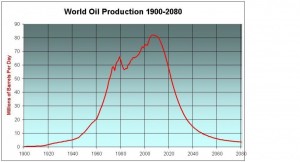
When oil supply is expected to decrease, food production is heavily dependant on fossil fuels, population is increasing, environment is heavily impacted and the climate is warming, what do we expect next? Does shifting from too much use of fossil fuels to renewable sources of energy make us optimistic of the future?
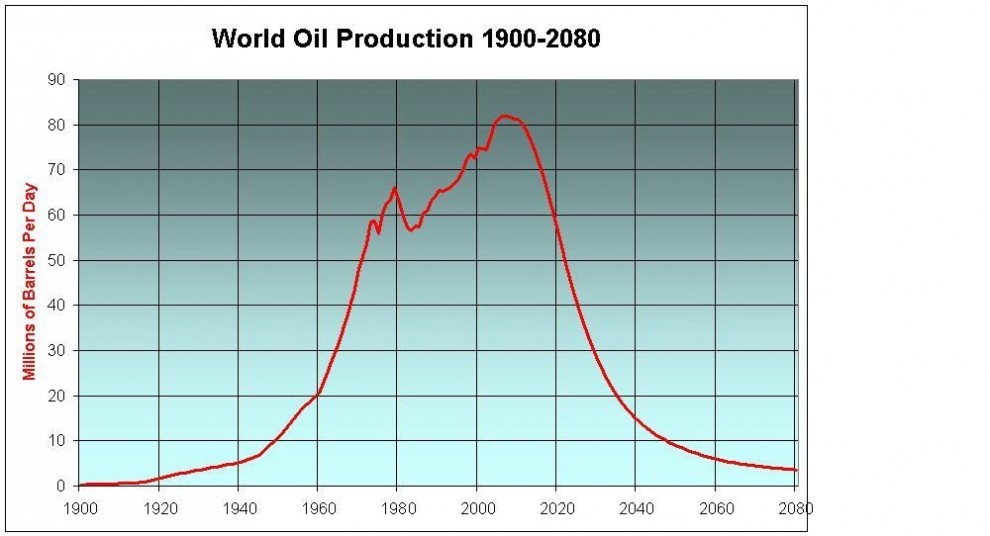
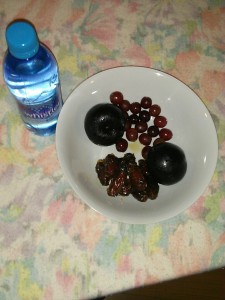
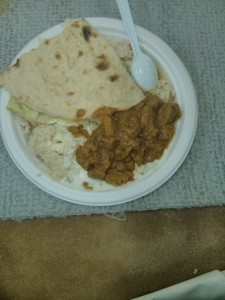
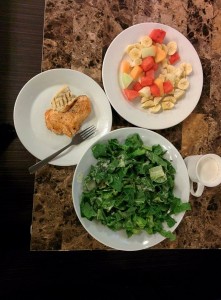
One response to “My food consumption for 24 hours!”